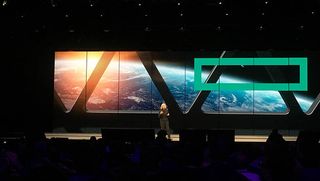Memory-driven computing becomes a reality with new HPE kit
The single-memory computer prototype features 160TB of memory to analyse vast amounts of data

Hewlett Packard Enterprise (HPE) has taken memory-driven computing the next level with the launch of its single-memory computer prototype that integrates 160TB of memory to simultaneously process more data than has even been achieved before in a single memory system.
As part of HPE's The Machine project, which aims to make memory-driven computing a reality, the single memory computer concept has enough power to work with the data held in every book of the US Library of Congress five times over, the company claimed.
The computer comprises 160TB of shared memory, spread across 40 physical nodes, which are interconnected by an unspecified high-performance fabric protocol; a Linux-based operating system running on Cavium's flagship second generation dual socket capable ARMv8-8 system on a chip, ThunderX2; optical communications links, including the X1 photonics module; and unspecified software programming tools "designed to take advantage of abundant persistent memory".
"The secrets to the next great scientific breakthrough, industry-changing innovation, or life-altering technology hide in plain sight behind the mountains of data we create every day," said Meg Whitman, CEO of HPE. "To realise this promise, we can't rely on the technologies of the past, we need a computer built for the Big Data era."
HPE explained that although this is only a prototype, the architecture behind it could potentially do a whole lot more, with an exabyte-scale single-memory system possible in future. The stage after that would be to develop a system integrating 4,096 yottabytes of memory described by the company as an "almost limitless" resource pool.
HPE said memory-driven computing holds an array of benefits over processor-led computing because it doesn't rely on memory, storage and processors interacting, making it a much more efficient way of analysing huge amounts of data.
"We believe memory-driven computing is the solution to move the technology industry forward in a way that can enable advancements across all aspects of society," said Mark Potter, CTO at HPE and director of Hewlett Packard Labs. "The architecture we have unveiled can be applied to every computing category from intelligent edge devices to supercomputers."
Get the ITPro. daily newsletter
Receive our latest news, industry updates, featured resources and more. Sign up today to receive our FREE report on AI cyber crime & security - newly updated for 2024.

Clare is the founder of Blue Cactus Digital, a digital marketing company that helps ethical and sustainability-focused businesses grow their customer base.
Prior to becoming a marketer, Clare was a journalist, working at a range of mobile device-focused outlets including Know Your Mobile before moving into freelance life.
As a freelance writer, she drew on her expertise in mobility to write features and guides for ITPro, as well as regularly writing news stories on a wide range of topics.




